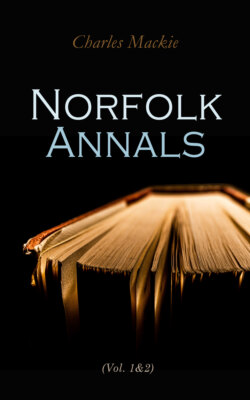Читать книгу Norfolk Annals (Vol. 1&2) - Charles Mackie - Страница 11
На сайте Литреса книга снята с продажи.
APRIL.
Оглавление3.—Died at the Cavalry Barracks, Norwich, Lieut. Robert Scully, 13th Light Dragoons. His remains were interred on Sunday, April 4th, with military honours, at St. Peter Mancroft.
4.—Died at Cambridge, Mrs. Lloyd, widow of Dean Lloyd, aged 79. “Her performances in needlework were so exquisitely wrought that they may justly be compared with the paintings of the most celebrated artists. The Transfiguration and other figures represented in the eastern windows of Norwich Cathedral have displayed the superior skill of her personal attainments.”
—Mousehold Heath, Norwich, was enclosed and cultivated. Plots of land were afterwards let at 25s. per acre.
—John Allen (23) and John Day (26), for burglary at the house of the Rev. Isaac Horsley, at North Walsham; Richard Grafton, for stealing a cow and three heifers; and James Chettleburgh (36), for stealing six sheep at Saxlingham, were executed at Thetford. “Day confessed to having committed four burglaries previous to that for which he suffered, and to having deserted thirteen times from different regiments.”
—In consequence of objections being made to the elections of Messrs. Staff and Proctor in the Wymer Ward, and of Messrs. Brittan and Scott in the Northern Ward, Norwich, on the ground of their being ineligible under the Corporation Act, having omitted to receive the Sacrament within a year previous to the election of Common Council, the Mayor did not make the returns till several days after the usual time. At a Court held on this day, the Recorder (Mr. Harvey), after the objections had been fully argued by counsel, declared that the persons objected to, who had the majority of votes, having omitted to come into Court according to summons, were not duly elected; but, as no regular notice had been given previous to the election, the candidates in the minority could not be returned. On May 2nd a rule was moved for in the Court of King’s Bench, to show cause why a mandamus should not be directed to the Mayor of Norwich to admit Mr. George Wymer into the office of Common Councilman of the city. Similar motions were made on behalf of Messrs. Bacon, Cooke, Fiske, and Webster, the other defeated candidates. “Lord Kenyon desired counsel to take rule to show cause, and to serve the rule not only on the Mayor, but also on those persons who were elected in fact, but not de jure.” On May 13th, Lord Kenyon confirmed the decision of the Recorder that “neither the candidates who had the majority of votes, from their not having taken the Sacrament, nor those in the minority were duly elected.” Another election for the wards took place on May 25th and 26th.
11.*—(Advt.) “To be seen alive in a genteel room at Mr. Peck’s Coffee-house, Church Stile, Market-place, Norwich, the largest Rattlesnake ever seen in England, 42 years old, near nine feet long, in full health and vigour. He is well secured, so that Ladies and Gentlemen may view him without the least danger. He has not taken any sustenance for the last 11 months. Admittance, Ladies and Gentlemen, 1s.; working people and children, 6d.”
14.—Intelligence received at Yarmouth of the destruction of the Danish fleet in Copenhagen Bay, by the British fleet, under the immediate command of Lord Nelson, on April 2nd, after a battle of four hours. Seventeen sail of the Danish navy were taken or destroyed. The news was conveyed to Norwich by the coach, which entered the city with colours flying; the Volunteer corps paraded in the Market Place and fired a feu de joie, and the bells of St. Peter Mancroft and of other churches were rung.
18.*—“By the latest returns of the Secret Committee the County of Norfolk is reported amongst the most loyal counties in the kingdom.”
20.—A performance took place at the Theatre Royal, Norwich, “towards raising a fund for the benefit of those who through age or infirmity are obliged to retire from the Stage.”
23.—Died at Norwich, Mr. John Bonsell, aged 75 years, “an eminent leather cutter, who for upwards of 20 years lived an abstemious life, refraining from animal food and fermented liquors. He rendered himself very conspicuous in the religious world, as he professed opinions, in a great measure peculiar to himself, which bordered upon fanaticism. He wrote several religious controversial pamphlets, as ‘The Ram’s Horn,’ &c.”
25.—Comparative returns of the population of Norwich, “as taken in 1801, 1786, 1752, and 1693,” were published. In 1801, the population was 36,832; in 1786, 40,051; in 1752, 36,169; in 1693, 28,881. “The decrease of the population of this city since 1786 is 3,219, but it is to be observed that 1786 was a year of peace, and that in the returns of 1801 those serving in the Navy, Army, and Militia are not included. Norwich, during the present war, has furnished at least 4,000 recruits for the Army and Navy, and these will account for the decrease, and also for the great excess of females, which appears by the returns to be above one-fourth. Of the present population, 408 are chiefly employed in agriculture, and 12,267 in trade, manufactures, and handicrafts.”
